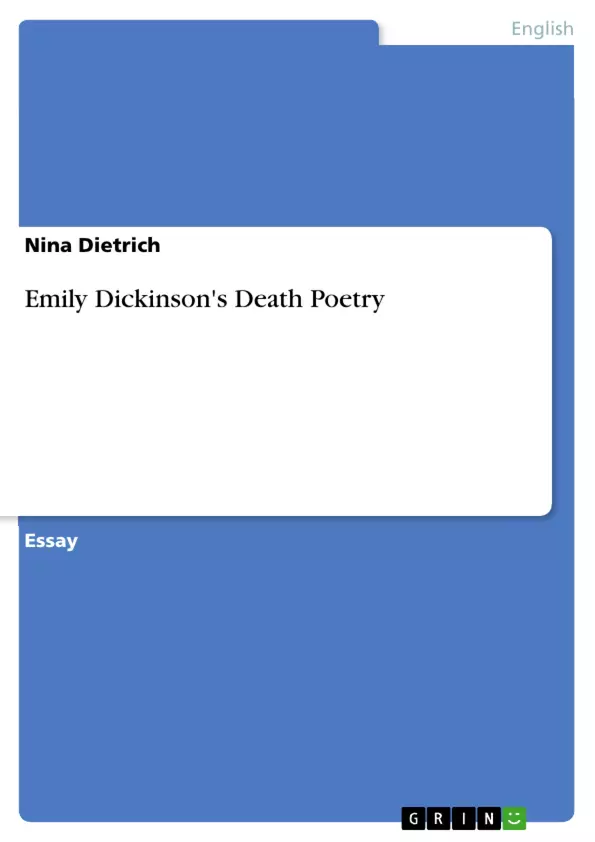After the first two volumes of Emily Dickinson’s poems appeared posthumously
in 1890 and 1891, there were many negative reviews of her work, such as,
If Miss Dickinson’s disjecta membra are poems, then Shakespeare’s prolonged
imposition should be exposed without further loss of time … Miss Dickinson’s
versicles have a queerness and a quaintness that have stirred a momentary
curiosity in emotional bosoms. Oblivion lingers in the immediate
neighbourhood.1
Today, however, Dickinson’s poetry is widely regarded as a milestone in American
literature. Dickinson has become a classic, famous for her vivid, powerful imagery and
innovative style. In fact, some critics consider her ‘the finest American woman poet’2
and claim that ‘[h]er accomplishment is so radically original that the entire model of
what poetry can know (and write) changes when her work is taken into account.’3 There
is an extensive range of criticism on Emily Dickinson’s poetry, many of which focuses
on her treatment of five dominant themes, that is, life, death, immortality, love and
nature. Dickinson’s early editors as well as critics including Ruth Flanders McNaughton
group the poems in these categories. According to Henry W. Wells, about one quarter of
Dickinson’s poems deals chiefly with the theme of death. 4 This part of Emily
Dickinson’s poetry will be in the centre of this essay. The essay will, first of all, explain
why the theme is so important for the poet. Why does Dickinson appear to be
preoccupied with death? Is it natural for her to make death one of her central topics?
1 Anonymous, ‘The New Pastoral Poetry,’ The Atlantic Monthly, 69, January 1892,
p.144, quoted in Ruth Flanders McNaughton, The Imagery of Emily Dickinson,
Norwood Editions, 1970, p. vii
2 David Porter, Dickinson: The Modern Idiom, Harvard University Press, 1981, p.1,
quoted in Helen McNeil, Emily Dickinson, Virago Press, 1986, p.1
3 Helen McNeil, Emily Dickinson, Virago Press, 1986, p.1
4 Henry W. Wells, Introduction to Emily Dickinson, Hendricks House, 1958, p. 94
Table of Contents
- Why Emily Dickinson's Death Poetry Matters
- The Importance of the Theme of Death
- The Incomprehensibility of Death
- The Futility of Resurrection
- The Acceptance of Death
- The Embracement of Death
Objectives and Key Themes
This essay aims to examine the theme of death in the poetry of Emily Dickinson, explaining why it is so central to her work and exploring the different attitudes she presents towards death and dying.
- The prevalence of death in 19th-century society
- Dickinson's personal experiences with death and mourning
- The conflict between denial and acceptance of death
- The idea of death as a natural and inevitable part of life
- The possibility of finding peace and acceptance in death
Chapter Summaries
- Why Emily Dickinson's Death Poetry Matters: This section introduces the essay's topic, highlighting the importance of death in Dickinson's poetry and the three different attitudes towards death that will be examined.
- The Importance of the Theme of Death: This section explores the historical context surrounding Dickinson's work, emphasizing the prevalence of death in 19th-century society and its impact on Dickinson's personal life.
- The Incomprehensibility of Death: This section analyzes Dickinson's portrayal of the struggle to accept death and understand its implications, focusing on poems that express confusion and disbelief in the face of death.
- The Futility of Resurrection: This section delves into Dickinson's exploration of the desire to resurrect the departed and the ultimate futility of such longing.
- The Acceptance of Death: This section examines Dickinson's presentation of the inevitability of death and the need for acceptance, drawing on poems that portray death as a natural and unavoidable part of life.
- The Embracement of Death: This section explores Dickinson's depiction of a more positive view of death, where it is seen as a potential path to peace and a transition to a higher realm.
Keywords
This essay explores the theme of death in the poetry of Emily Dickinson, focusing on the historical context, the poet's personal experiences, and the different ways she approaches the concept of death. Key terms include: death, dying, immortality, acceptance, denial, embracement, nineteenth-century society, and the impact of personal loss.
Frequently Asked Questions
Why is the theme of death so prominent in Emily Dickinson's poetry?
Death was a prevalent part of 19th-century life, and Dickinson experienced significant personal losses. About one quarter of her poems deal primarily with death as she struggled to comprehend its mystery.
What are the different attitudes toward death explored in her work?
Dickinson presents three main attitudes: the incomprehensibility and denial of death, the eventual acceptance of its inevitability, and the positive embracement of death as a transition to peace.
How did 19th-century society influence Dickinson's view on mortality?
The high mortality rates and the cultural focus on mourning in the 1800s made death a constant presence, which is reflected in the vivid and powerful imagery of her "death poetry."
Does Dickinson believe in resurrection in her poems?
Her poetry often explores the longing to resurrect the departed but ultimately highlights the futility and pain associated with such desires.
How has the critical reception of Dickinson's work changed over time?
Initially met with negative reviews for being "queer" or "quaint," her work is now considered a milestone in American literature, celebrated for its radical originality and powerful themes.
- Quote paper
- Nina Dietrich (Author), 2002, Emily Dickinson's Death Poetry, Munich, GRIN Verlag, https://www.grin.com/document/19970



